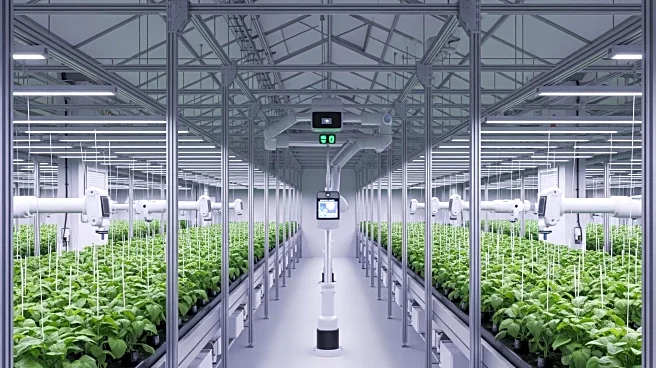What's Happening?
Ridder and Blue Radix recently hosted a breakfast seminar in Querétaro, Mexico, to showcase the integration of artificial intelligence in horticulture. The event gathered greenhouse growers and industry
professionals to discuss how AI is addressing labor shortages and optimizing resource use in agriculture. Ridder's smart greenhouse solutions, including the GROW robot for tomato harvesting, and Blue Radix's autonomous Climate and Irrigation Control, were highlighted as key innovations. These technologies aim to enhance efficiency by automating climate control and water management, allowing for data-driven decision-making. The seminar emphasized the transition from automated to autonomous systems, which can independently make decisions to improve greenhouse operations.
Why It's Important?
The introduction of AI in agriculture is significant as it addresses critical challenges such as labor shortages and resource management. By automating processes, these technologies can lead to more consistent crop yields and reduced operational costs, benefiting growers economically. The collaboration between Ridder and Blue Radix exemplifies how strategic partnerships can drive technological advancements in agriculture, potentially setting a precedent for other regions. This shift towards digitalization in agriculture could enhance sustainability and competitiveness, crucial for meeting the growing global food demand.
What's Next?
As AI technologies continue to be implemented, Mexican greenhouse growers may experience increased productivity and sustainability. The success of these innovations could encourage further adoption of AI in agriculture across other regions. Stakeholders, including policymakers and agricultural businesses, might focus on supporting such technological advancements to boost the sector's growth. Additionally, ongoing collaboration between tech companies and agricultural experts will likely be essential in refining these systems and expanding their applications.
Beyond the Headlines
The integration of AI in agriculture raises questions about the future workforce in the sector. While automation can alleviate labor shortages, it may also require workers to acquire new skills to manage and maintain these technologies. Furthermore, the reliance on data-driven systems highlights the importance of data security and privacy in agricultural operations. As these technologies evolve, ethical considerations regarding their impact on employment and data usage will need to be addressed.









